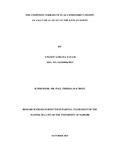| dc.description.abstract | Since citizenship is defined with reference to a state, advances of new forms of
belonging, like dual citizenship is fundamentally adversative to the formation of the
modern international order based on the state. Simultaneous loyalty to more than one
state is incompatible with membership built on the principle of equality of citizenship
and territorial connections. In spite, the community of nations appears to embrace the
concept of dual citizenship.
Today, the fear of grave international frictions arising from dual nationality seems
significantly diminished. To Thomas Faist,1 dual citizenship is neither an evil nor an
intrinsic value in political communities. Indeed, Citizenship and political loyalty to a
state that has traditionally been considered inseparable, has in recent years
increasingly tolerated multiple citizenship. More than half of all states now tolerate
some form of dual citizenship.2 Countries have made efforts to adopt the concept of
dual citizenship in various forms. These varied forms of dual citizenship arrangements
have produced multifaceted effects on the rights of an individual acquiring and the
dual citizenship granting state. This fundamentally informs the basis of this study. | en_US |

